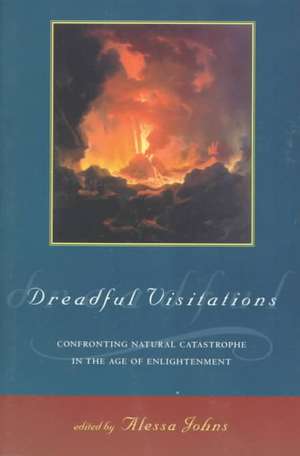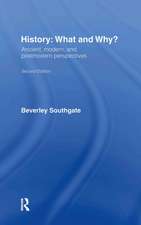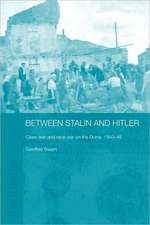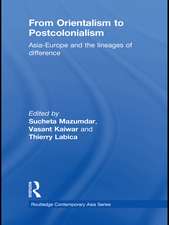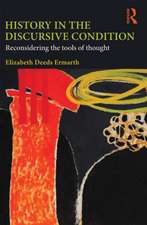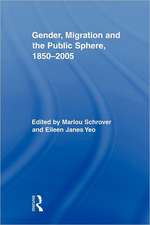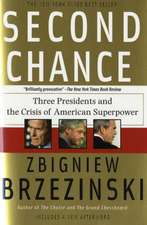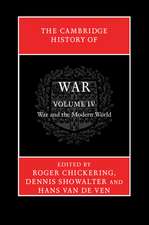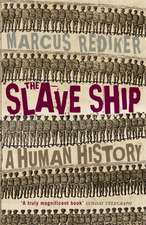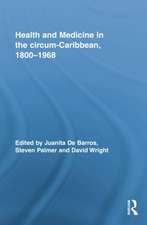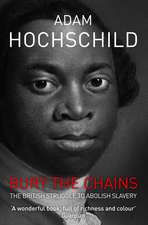Dreadful Visitations: Confronting Natural Catastrophe in the Age of Enlightenment
Autor Alessa Johnsen Limba Engleză Paperback – 21 iun 1999
| Toate formatele și edițiile | Preț | Express |
|---|---|---|
| Paperback (1) | 367.90 lei 6-8 săpt. | |
| Taylor & Francis – 21 iun 1999 | 367.90 lei 6-8 săpt. | |
| Hardback (1) | 1113.60 lei 6-8 săpt. | |
| Taylor & Francis – 21 iun 1999 | 1113.60 lei 6-8 săpt. |
Preț: 367.90 lei
Nou
Puncte Express: 552
Preț estimativ în valută:
70.41€ • 73.23$ • 58.92£
70.41€ • 73.23$ • 58.92£
Carte tipărită la comandă
Livrare economică 14-28 martie
Preluare comenzi: 021 569.72.76
Specificații
ISBN-13: 9780415921763
ISBN-10: 0415921767
Pagini: 222
Ilustrații: 12 halftones
Dimensiuni: 152 x 229 x 16 mm
Greutate: 0.41 kg
Ediția:New.
Editura: Taylor & Francis
Colecția Routledge
Locul publicării:Oxford, United Kingdom
ISBN-10: 0415921767
Pagini: 222
Ilustrații: 12 halftones
Dimensiuni: 152 x 229 x 16 mm
Greutate: 0.41 kg
Ediția:New.
Editura: Taylor & Francis
Colecția Routledge
Locul publicării:Oxford, United Kingdom
Notă biografică
Alessa Johns is Assistant Professor of English at the University of California, Davis. She has published articles on eighteenth-century British literature including the works of Mary Astell, Sarah Fielding, Sarah Scott, Mary Hamilton and Daniel Defoe.
Recenzii
"How 'enlightened' was the Enlightenment? Natural cataclysm was the dark mirror into which eighteenth-century Europeans preferred not to gaze. When they did--as these brilliant case studies show--the gods of optimism did not smile back at them." -- Mike Davis, author of Ecology of Fear and City of Quartz
"Dreadful Visitations offers a series of outstanding case studies that explore the bonds between European societies and colonial territories, and the endurance of faith in an age of reason and profit. This is a marvelous example of the virtues of comparative history." -- Paula Findlen, author of Possessing Nature, Stanford University
"The authors of Dreadful Visitations skilfully analyze disasters, their preconditions, their impacts, and how people interpret them to reveal fundamental social, ideological and material features of society. From the analysis of literary texts to architectural history to reconstruction narratives, the book is filled with information and insights for advancing theory. Dreadful Visitations should prove extremely valuable for both social scientists and historians concerned with the impact disasters have on society." -- Anthony Oliver-Smith, author of The Martyred City: Death and Rebirth in the Andes and editor of Natural Disasters and Cultural Responses, University of Florida
"As this volume makes clear, natural disasters are rarely wholly "natural," but are the products of human agency as well. The essays in this marvellous collection emphasize the cultural response of Europeans--at home and abroad--to disaster in an age when events formerly seen as the handiwork of an angry God were being questioned. Anyone interested in topics from social history to environmental studies will find much of value here." -- Stuart Schwartz, author of Slaves, Peasants, and Rebels: Reconsidering Brazilian Slavery, Yale University
"Interdisplinary in approach, it succeeds well in its aim to capture the global impact of global catastrophies that shook the modern world. This text broadens our historical horizons considerably, offering a richer understanding of the itneraction between cultures." -- Lindsay Wilson, Northern Arizona University
"Dreadful Visitations makes a useful and welcome contribution to the new and increasingly global history of culture, polity, and the natural environment." -- WILLIAM AND MARY QUARTERLY
"Dreadful Visitations makes a useful and welcome contribution to the new and increasingly global history of culture, polity, and the natural environment." -- WILLIAM AND MARY QUARTERLY John L. Brooke, Tufts University
"Dreadful Visitations offers a series of outstanding case studies that explore the bonds between European societies and colonial territories, and the endurance of faith in an age of reason and profit. This is a marvelous example of the virtues of comparative history." -- Paula Findlen, author of Possessing Nature, Stanford University
"The authors of Dreadful Visitations skilfully analyze disasters, their preconditions, their impacts, and how people interpret them to reveal fundamental social, ideological and material features of society. From the analysis of literary texts to architectural history to reconstruction narratives, the book is filled with information and insights for advancing theory. Dreadful Visitations should prove extremely valuable for both social scientists and historians concerned with the impact disasters have on society." -- Anthony Oliver-Smith, author of The Martyred City: Death and Rebirth in the Andes and editor of Natural Disasters and Cultural Responses, University of Florida
"As this volume makes clear, natural disasters are rarely wholly "natural," but are the products of human agency as well. The essays in this marvellous collection emphasize the cultural response of Europeans--at home and abroad--to disaster in an age when events formerly seen as the handiwork of an angry God were being questioned. Anyone interested in topics from social history to environmental studies will find much of value here." -- Stuart Schwartz, author of Slaves, Peasants, and Rebels: Reconsidering Brazilian Slavery, Yale University
"Interdisplinary in approach, it succeeds well in its aim to capture the global impact of global catastrophies that shook the modern world. This text broadens our historical horizons considerably, offering a richer understanding of the itneraction between cultures." -- Lindsay Wilson, Northern Arizona University
"Dreadful Visitations makes a useful and welcome contribution to the new and increasingly global history of culture, polity, and the natural environment." -- WILLIAM AND MARY QUARTERLY
"Dreadful Visitations makes a useful and welcome contribution to the new and increasingly global history of culture, polity, and the natural environment." -- WILLIAM AND MARY QUARTERLY John L. Brooke, Tufts University
Cuprins
Part I European Responses to Catastrophe; Chapter 1 Confrontations with the Plague in Eighteenth-Century France, Daniel Gordon; Chapter 2 Defoe and Disasters, G. A. Starr; Chapter 3 ::, Stephen Tobriner; Part II Colonial Perspectives and New World Calamities; Chapter 4 Hunger in the Garden of Plenty, David Arnold; Chapter 5 Shaking the Unstable Empire, Charles F. Walker; Chapter 6 “The Hungry Year”, Alan Taylor;
